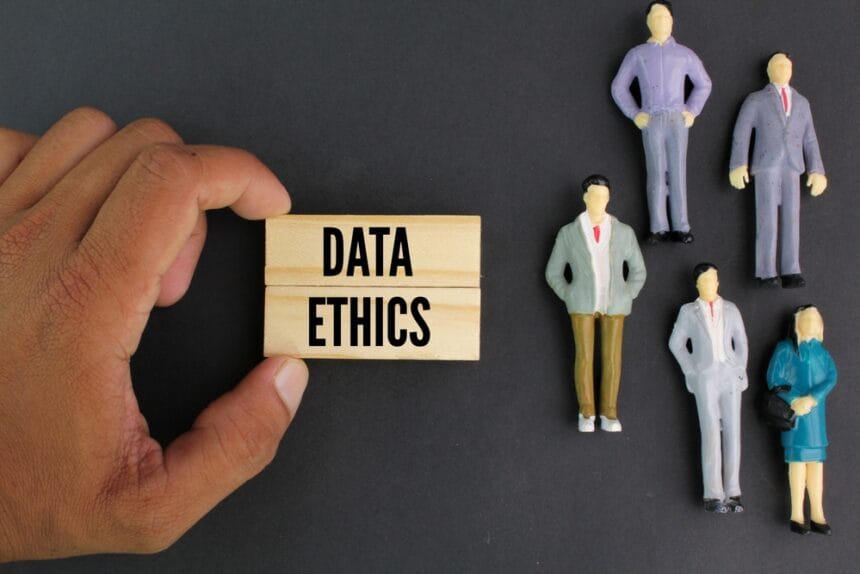We live in a digital age, where data is the new currency. Every day, a massive amount of information is generated, processed, and stored, and it is critical for everyone who offers their services online to prioritize privacy and ensure responsible data practices. No matter whether you provide educational software development services or sell smartphones in a Shopify store, you’re likely dealing with lots of customer data—and if you’re not responsible with that, you will ruin customer trust and the reputation of your company.
Don’t want to mess things up? Then adhere to data ethics.
Data ethics involves the ethical handling of data, safeguarding privacy, and respecting the rights of individuals. In this article, we will explore its importance and discuss how organizations can uphold privacy and ensure that they work with data the right way.
Keep reading to learn more!
The core idea behind data ethics
At the core of data ethics is the concept of safeguarding privacy. Individuals have the right to control their personal information and decide how it is used and shared. It is essential for organizations to handle data in a way that respects individuals’ privacy rights. This includes obtaining informed consent from individuals before collecting their data, being transparent about how the collected materials will be used, and providing mechanisms for individuals to opt out or have their data deleted if desired. Respecting privacy builds trust between organizations and individuals and ensures that data is used in a fair and ethical manner.
Responsible data practices go beyond privacy and extend to the overall handling, processing, and sharing of information. Organizations must ensure that data is collected and used for legitimate purposes and that appropriate security measures are in place to protect it from unauthorized access or breaches. Data should only be collected and retained as long as necessary and should be disposed of securely once it is no longer needed. Responsible data practices also involve ensuring the accuracy and integrity of the data, as well as providing individuals with access to their data and the ability to correct any inaccuracies.
Data ethics: key principles
Transparency is a key principle of data ethics. Organizations should be transparent about their data practices, including how data is collected, stored, and used. They should provide clear and easily understandable privacy policies and terms of service to individuals, outlining the purpose of data collection, the types of info collected, and how it will be used and shared. Organizations should also be transparent about any third parties with whom data is shared and ensure that these parties adhere to similar data ethics principles. By being transparent, organizations empower individuals to make informed decisions about their data and foster a culture of trust and accountability.
Data ethics also involves addressing biases and discrimination in data collection and analysis. As data becomes increasingly used for decision-making processes, it is important to be aware of potential biases and ensure that data-driven decisions are fair and unbiased. Organizations should regularly evaluate their collection practices to identify and mitigate any biases that may arise, and they should strive to provide equal opportunities and outcomes for all individuals, regardless of their personal characteristics.
To uphold data ethics, organizations should establish clear guidelines and policies that promote responsible data practices. This includes training employees on data ethics principles, implementing data protection and security measures, and regularly auditing and reviewing data practices to ensure compliance. Organizations should also stay updated with evolving privacy regulations and industry best practices to ensure that their practices align with legal and ethical standards.
How data ethics benefits organizations
Organizations can derive numerous benefits from implementing ethical data practices:
- Enhanced reputation and trust. Upholding ethical data practices helps organizations build a positive reputation and establish trust with their customers, clients, employees, and stakeholders. When individuals see that an organization values their privacy, respects their rights, and handles data responsibly, they are more likely to trust the organization and engage with its products or services.
- Improved customer relationships. Data ethics fosters stronger relationships with customers. By being transparent about data collection and usage, obtaining informed consent, and respecting individuals’ preferences, organizations can enhance customer satisfaction and loyalty. Customers feel more confident in sharing their information and engaging with organizations that prioritize their privacy and data protection.
- Competitive advantage. Ethical data practices provide a competitive edge in the market. As data breaches and unethical data practices become more prevalent, consumers are increasingly concerned about privacy and data security. Organizations that proactively address these concerns and demonstrate ethical data practices differentiate themselves from their competitors. Such organizations are more likely to attract customers who prioritize privacy and security.
- Compliance with regulations. Implementing ethical data practices ensures compliance with data protection regulations. Governments and regulatory bodies around the world have introduced strict data privacy laws, such as the GDPR, CCPA, and others. Adhering to these regulations not only avoids legal consequences and penalties but also demonstrates an organization’s commitment to operating within legal and ethical boundaries.
- Mitigation of risks and reputational damage. Unethical data practices result in significant risks and reputational damage. Data breaches, misuse of personal information, and unethical data handling can result in severe financial and legal consequences, as well as loss of customer trust. By implementing ethical data practices, organizations reduce the likelihood of data breaches, protect against reputational damage, and mitigate potential risks associated with non-compliance and unethical behavior.
Wrapping Up
In conclusion, data ethics plays a critical role in safeguarding privacy and ensuring responsible data practices. Organizations must prioritize privacy, respect individuals’ rights, and handle information in a transparent and ethical manner. Responsible data practices involve collecting and using data for legitimate purposes, implementing security measures, being transparent about data practices, addressing biases, and promoting equal opportunities. By upholding data ethics, organizations build trust, protect individuals’ privacy, and contribute to a data-driven society that benefits everyone.

